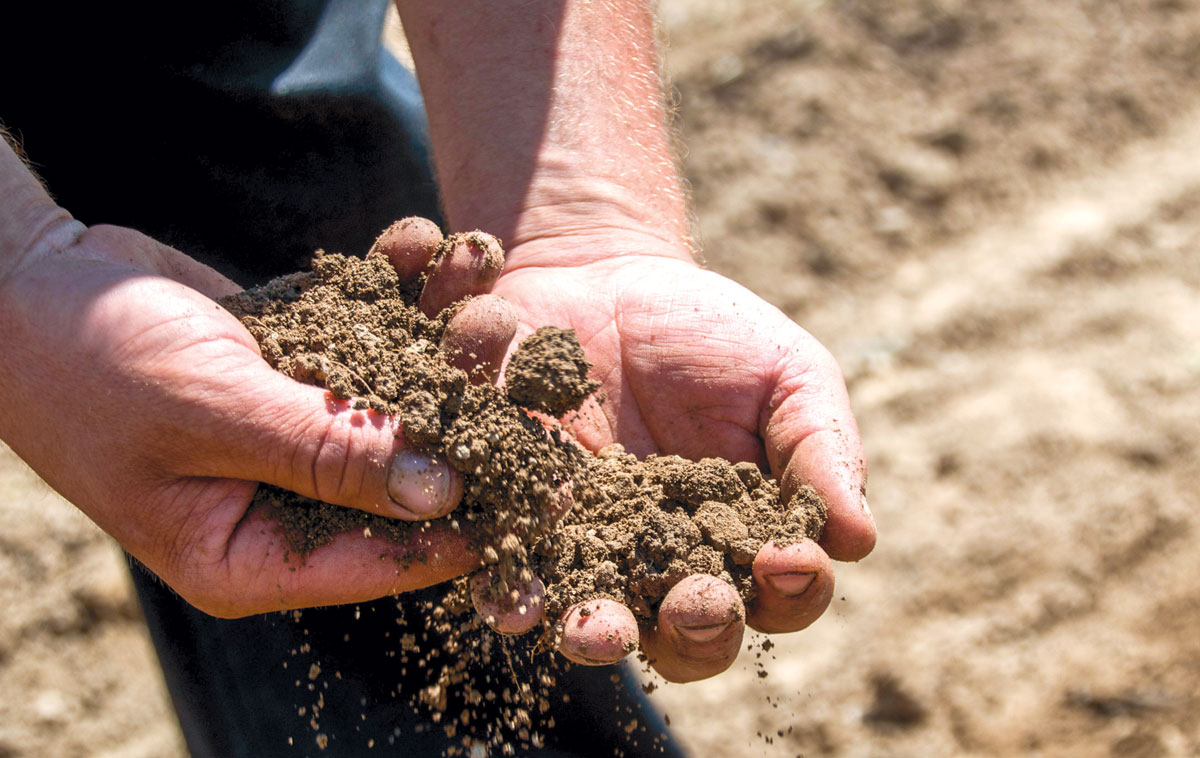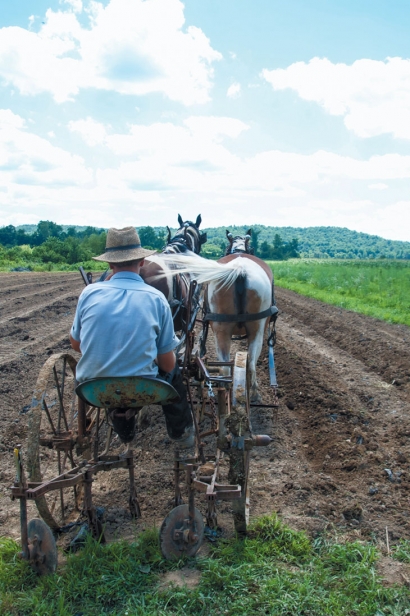Blossom Acres: One Farmer and His Commitment to Sowing Good Soil
A Soil Steward
Standing on his 30 acres of farmland in Coshocton, known as Blossom Acres Produce, Eli Yoder recognizes that underneath his feet lies a treasure: rich and dynamic brown soil.
Eli, his wife Susan and their six children have called this farm home for four years. When the family purchased the property in 2011 the soil, which was previously farmed conventionally, was “lifeless,” says Eli.
“Farming really boils down to what is in the soil. If your soil is healthy and full of microbes then in turn, the food that you eat from the soil will be healthy,” Eli notes as he gazes at his fields teeming with life.
In the three years prior to finding their home in Coshocton, the family farmed a small piece of land a few miles away. However with little room for expansion, they sought a new location where they could truly invest in the soil.
At Blossom Acres the biological life of the soil governs all production on the farm. Though not certified organic, the farm maintains sustainable agricultural practices. Eli is aware of the important role that he serves as a steward of the land. He knows that he is not the master of the soil—the land is his partner and must not be treated with reckless abandon.
“Our goal is to produce high-nutrient food,” Eli says while examining a bright green zucchini recently plucked from the plant.
Building Soil Fertility
In addition to farming with minimal chemical inputs, Blossom Acres focuses on the use of cover crops and the application of micronutrient sprays and compost. An avant-garde chef, Eli recognizes that the best recipe for quality produce is understanding and aiding the biological stew brewing under his feet.
“Eli is doing such a great job; his effort is amazing,” says Christine Okonak, a longtime Blossom Acres Produce community-supported agriculture (CSA) subscriber. “He is truly farming for all of the right reasons; he is doing it to support his family and to share the value of eating healthy foods grown the right way. He is so passionate about providing healthy food to people.”
In cover crop farming a field is planted with the sole intention of building soil fertility. The crop is plowed under to add nutrients to the soil through the break-down of the plant’s organic matter. Cover crops also prevent soil erosion. At Blossom Acres Produce, Eli likes to grow a buckwheat cover since it attracts bees.
Eli also applies micronutrients to his fields on a weekly basis making the produce grown on the farm taste good. By introducing a wide variety of micronutrients during the growing process he believes his harvest is also more nutrient-dense.
“If you grow something and you don’t add chemicals, you’ve got a naturally grown product. However, even with this natural plant, if the soil is not healthy then the fruit is not healthy,” Eli explains.
The Big Picture
2015 has been declared the International Year of Soils by the United Nations. Home to a quarter of the world’s biodiversity, an important filter of water and the largest home of carbon on land, soil is vital to a host of natural processes. In just a tablespoon of healthy soil there are billions of microorganisms.
With increases in farm technology, however, the Earth’s soil, a non-renewable resource, has suffered irreversible damage. Intensive production practices, chemical dependence, and soil erosion have depleted the amount and quality of this most precious resource.
Nevertheless, there is hope: Experts believe that sustainable soil management practices, like those practiced at Blossom Acres Produce, may yield up to 58% more food, which could help our world to meet the needs of a growing population in an ecologically conscious way.
As an environmental steward, Eli strives to help other farmers learn the benefits of farming sustainably. He hosts field walks for area farmers enabling them to learn from his successes and challenges. The evenings include a visit from a soil consultant to educate the producers about the life blossoming under their feet.
The Payoff
Though he has had to weather a few storms, Eli has seen the attention he pays to the biological health of the soil pay off tremendously during recent growing seasons.
First and foremost, he reports that both the quality and the quantity of the produce grown at Blossom Acres has improved. Just this year Eli has seen his potato crop double due to recent soil quality investments.
Additionally, he has watched the ecosystem on his farm come to life with a dazzling array of activity in the fields.
“I’ve seen the earthworm population multiply tremendously,” he notes. “The first year on the farm there were hardly any earthworms in the soil. That year we dug through our 14 inches of topsoil in several locations and only saw one or two worms each time. However, now when pulling up a plant, it’s not unusual to see eight to 12 worms just at the surface of the soil.”
And his supporters have also taken note.
“I have never had produce that tastes as good as that grown at Blossom Acres Produce,” Christine says. “It may not be the biggest head of broccoli in your CSA, but it will be the tastiest broccoli that you will ever eat.”
Blossom Acres Produce can be found at the North Market and Powell farmers markets on Saturdays. Additionally, the farm offers a CSA drop-off on Tuesdays from May through October in Westerville, Powell, and Hilliard, as well as a CSA drop-off on Saturdays at the North Market. The CSA includes vegetables, strawberries, herbs, and occasionally specialty breads baked on the farm. An egg share is also offered. To learn more, visit their website.






